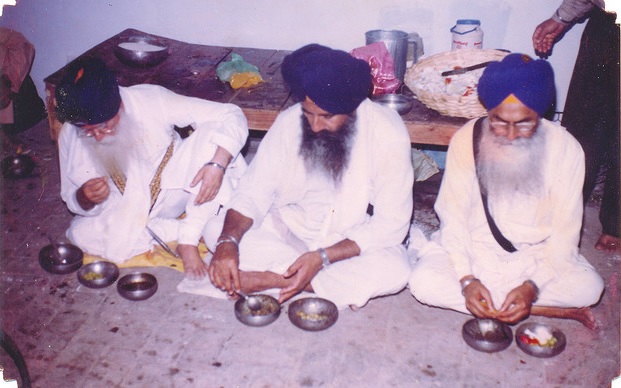 Gurbani tells us not to eat that which will cause us trouble:
Gurbani tells us not to eat that which will cause us trouble:
ਬਾਬਾ ਹੋਰੁ ਖਾਣਾ ਖੁਸੀ ਖੁਆਰੁ ॥
ਜਿਤੁ ਖਾਧੈ ਤਨੁ ਪੀੜੀਐ ਮਨ ਮਹਿ ਚਲਹਿ ਵਿਕਾਰ ॥੧॥
“O Baba! The pleasures of other foods are false, by eating which, the body is ruined, and wickedness and corruption enters into the mind. ||1||Pause||”
(SGGS – 16)
Gurbani tells us again to eat the food of the saints and to avoid the food of faithless people as if it were poison.
ਸੰਤਨ ਕਾ ਦਾਨਾ ਰੂਖਾ ਸੋ ਸਰਬ ਨਿਧਾਨ ||
ਗ੍ਰਿਹਿ ਸਾਕਤ ਛਤੀਹ ਪ੍ਰਕਾਰ ਤੇ ਬਿਖੂ ਸਮਾਨ ||੨||
“The dry bread of the Saints is equal to all treasures. The thirty-six tasty dishes of the faithless cynic are just like poison.”
(SGGS – 811)
Puraatan Rehitnamai (code of conducts written by Sikhs from the time of Guru Gobind Singh Jee) make it clear that Sikhs were given instructions to only eat from other Amrit Dharis.
ਭੋਜਨਾਦਿ ਮੁੰਡਿਤ ਨਾਲ ਛਕੇ ਤਨਖਾਹੀਆ ॥
(ਭਾਈ ਦਯਾ ਸਿੰਘ ਜੀ ਰਹਿਤਨਾਮਾ, ਪੰਨਾ ੭੨ – ‘ਰਹਿਤਨਾਮੇ’, ਸੰਪਾਦਕ ਪਿਆਰਾ ਸਿੰਘ ਪਦਮ)
“One who eats food with a Mona/non-Sikh, is guilty of a breach of conduct”
(Bhai Daya Singh Ji Rehitnama – Piara Singh Padam’s Rehitnamay pg. 72)
ਗੁਰੂ ਕਾ ਸਿਖ, ਸਰਦਾਰ ਹੋਵੈ, ਸ਼ਾਹੂਕਾਰ ਹੋਵੈ, ਮੁਸ੍ਨਦੀ ਹੋਵੈ, ਆਪਣੇ ਲੰਗਰ ਰਸੋਈ ਵਿਚ ਸਿਖ ਰਖੇ ॥
ਹੁਕਈ, ਟੋਪੀਆ, ਭਾਦਣੀ, ਚੋਰ, ਯਾਰ, ਜੂਏਬਾਜ਼, ਕੁਰਹਿਤੀਆ ਨਾ ਰਖੈ ॥
“A Guru ka Sikh…should keep only a Sikh in his langar and kitchen. Smokers, hat-wearers, shaven people, thieves, gamblers, kurehitees should not be kept”
(Rehitnama Bhai Chaupa Singh Ji – Piara Singh Padam, pg. 85)
Many Gursikhs also insist on cooking in and eating from Sarbloh (Iron) utensils, which also has support from Puraatan Rehitnamai:
ਪਾਤ੍ਰ ਸਰਬ ਸੁ ਲੋਹ ਕੇ, ਭੁਗਤੇ ਅਸਨ ਸੁਆਦਿ ਲੱਕੜੀ ਕੋ ਭੋਜਨ ਭਖੇ, ਨੀਲ ਬਸਤ੍ਰ ਮਿਰਜਾਦ…ਲੋਹ ਪਾਤ੍ਰ ਮੈਂ ਛਕੈ…
(ਭਾਈ ਦਯਾ ਸਿੰਘ ਜੀ ਰਹਿਤਨਾਮਾ, ਪੰਨਾ 75 – ‘ਰਹਿਤਨਾਮੇ’, ਸੰਪਾਦਕ ਪਿਆਰਾ ਸਿੰਘ ਪਦਮ)
“Using utensils of sarbloh, one eats tasty food…one should eat in sarb loh utensils”
(Rehitnama Bhai Daya Singh Ji – Piara Singh Padam, pg. 75)
Historical evidence of Bibek Rehit can be found in the historical records of M.A. Macauliffe who writes:
“…so amid the general corruption of the religion of Gobind there are to be found about one hundred Sikhs at Naderh in the Dakhan, who are said to have up to the present time preserved intact the faith and ceremonies of Guru Gobind. They have kept aloof from the contact of Brahmins. Brahmin ministrations are not permitted either at their births, their marriages, or their obsequies. Whether they be Brahmin or Sudras who receive the sacramental pahul, all are by this fact admitted within a pale of social and religious equality. Brahmin weds Sudra and Sudra weds Brahmin. No need, therefore, to put their infant daughters to death through fear of not obtaining for them husbands of their own social status, as is the custom among such a large section of the Sikhs of Punjab. And widow marriages, reprobated by Hindus and now consequently by the Sikhs of the Punjab are habitually solemnised with the clearest conscience among the Sikhs of Naderh…At Patna, as at Naderh, the Sikhs pay the strictest attention to the Injunctions of Guru Gobind. Sleeping or waking, they are never without the habiliments known as the “five Ks.” So strong is the aversion of the more orthodox among them to Hindus, that they will not even partake of food cooked by their hands. This is carrying orthodoxy a long way, but still further is it carried when they will not partake of food cooked even by a Sikh who has not on his person all the ‘five Ks’”
(Macauliffe in “The Sikh Religion under Banda and its Present Condition”)
There are varying levels of dietary bibek. There are also other rehats, depending on how strict an individual wishes to be and how much of Guru Sahib’s rehat they are able to follow. These rehats include:
* Eating cooked food from Amritdharis’ hands exclusively
* Not eating any processed or machine made foods (as the factories are still populated by non-Amrit Dharis and proper cleanliness or “suchum” is not observed)
* Eating food only prepared in Sarbloh (Iron) by Amritdharis
Eating from other Gursikhs, especially if those Gursikhs recite Gurbani while preparing their food is ideal. Just as Amrit is required to be prepared by an Amrit Dhari while reciting Gurbani in Sarbloh (iron), this is also the ideal way to prepare food in our daily lives. Bhai Randhir Singh was a strict proponent of only eating from other Amrit Dharis and went through great sacrifices to preserve this rehit while he was in jail for 16 years.
Eating from Amrit Dharis who prepare food while reading Gurbani allows a Sikh to stay in good sangat and also enforces a level of simplicity and discipline in their life.
Whatever level of practice an individual interprets is right for them, a Gursikh should at least observe the minimum. The reason Gursikhs increase the level of observing Rehit is only to strengthen their mind, to avoid it wandering while in connection with the Divine and to improve concentration. If these Rehits (or any other) are kept for any other reason (for show etc) they become a hindrance to us and slow down progression, which in return becomes hypocrisy (pakhand) and ego. This is the reason why a lot of Gursikhs keep their personal Rehit discreet, to avoid collision with ego.